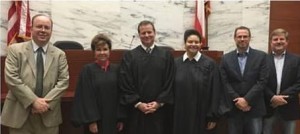In Freedom LHV, LLC v. IFC White Rock, Inc., the Dallas Court of Appeals reversed a temporary restraining order, reminding us yet again that under Rule 683, a trial court must state the specific reasons for issuing a temporary restraining order or temporary injunction, or the order is void. As the Dallas Court of Appeals wrote: “Even if a sound reason for granting relief appears elsewhere in the record, the Texas Supreme Court has stated in the strongest terms that rule of civil procedure 683 is mandatory.”
Practice pointers for those drafting a temporary restraining order or temporary injunction:
DO INCLUDE
- specific and legally sufficient reasons for granting the TRO or temporary injunction finding all three necessary elements: (1) a cause of action against the defendant; (2) a probable right to the relief sought; and (3) a probable, imminent, and irreparable injury in the interim; and
- if it is a temporary injunction, a trial setting.
DO NOT INCLUDE
- conclusory statements, e.g. “plaintiff will be irreparably injured” without a description of that specific injury and why it is probable, imminent, and irreparable; or
- statements that merely reference the complaint or other document.







